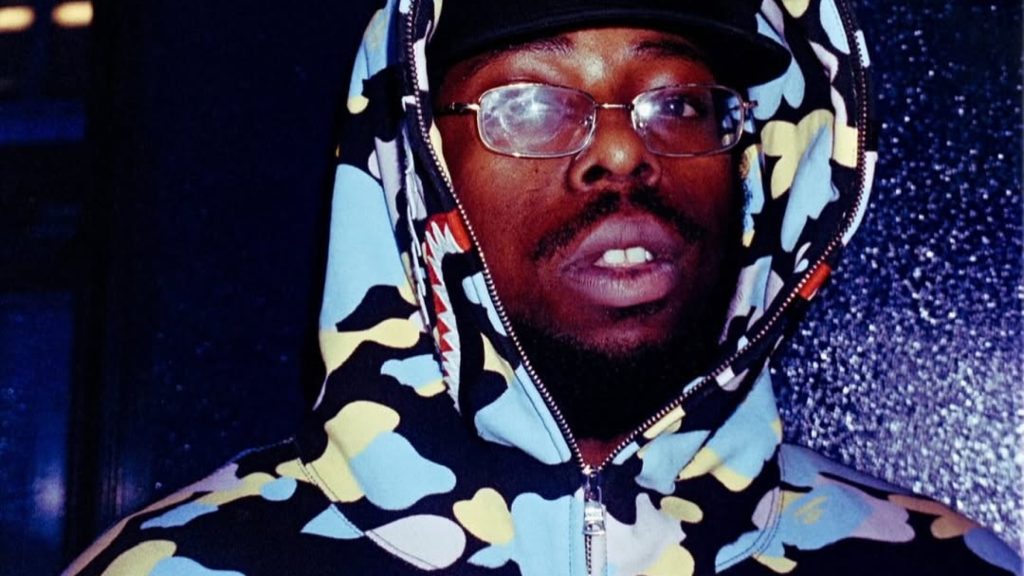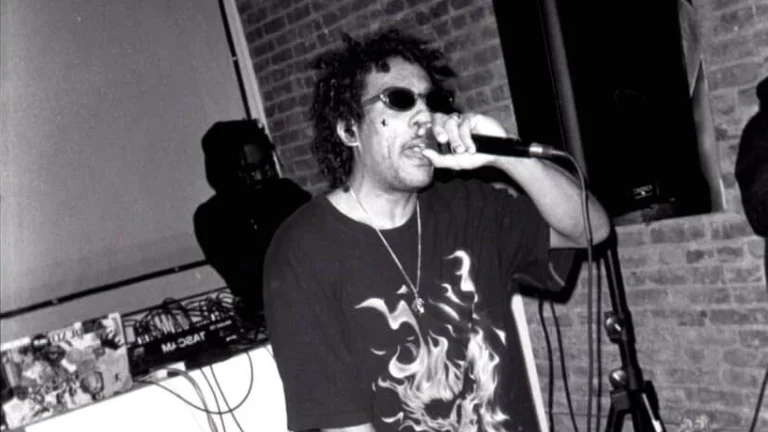A lengthy list of bizarrely titled songs, or a single 44-minute SoundCloud upload (for those listening to the album as initially intended). An album cover consisting of a wall of text, supposedly quoting Rick Rubin on his complicated feelings towards creativity. And then, quite suddenly, a comedic and crude recreation of the 20th Century Studios logo jingle, seemingly blasted out by a small group of friends into a phone late into an alcohol-heavy night followed by an immediate descent into glitchy, crunchy madness.
This is what greets listeners when they happen upon The Beautiful Malaise, the debut album from Everything is Psychedelic. The UK duo merges across England’s North and South divide, one of the many lines they cross as artists, with Birmingham MC Tony Bontana merging alongside the wild production of London beat wizard Psychedelic Ensemble.
So, after their amusing film-inspired introduction, where does The Beautiful Malaise take its audience? This odyssey is a bombardment of sound, constantly defying any easy definition by design. One thing is certain, though, amid this great chaos, the daring music could only ever have been birthed into existence from the depths of internet music culture. It’s a project crammed with eclectic, obscure samples, often used for only fractions of a second, with numerous references to the online world, too, such as when Letterboxd is discussed for an entire skit/interlude. Beyond the music, the duo intends for listeners to immerse themselves in the album online. Using Instagram to promote themselves, SoundCloud to give fans early access, Bandcamp to deliver CDs among custom-made stickers, and RateYourMusic to encourage listeners to discuss their thoughts with one another, Everything is Psychedelic make engaging with the internet a part of the album itself. The product of this approach is a thrillingly cinematic lo-fi experience. In the same way Death Grips’ early music videos only felt rightly absorbed online, this record simply feels digital through its use of sounds only technology could create and oddball track titles (in those spaces where they’re available).
The Beautiful Malaise is, from start to finish, a maddeningly audacious and bold album. It can be hyperactive and brutally aggressive (and is, most of the time) but what is impressive is that within that unwieldy, hardcore style there is still space allowed for beautiful sounds, various quirks, and striking lyricism rich in gritty imagery. For example, track 9 (named “Bob Dylan Prolly Chill AF/OBEY MY BODY LIKE IT’S 2011 on the album’s official releases) is close to melodic with its repeated lines and looping drums, but the choppiness of the sounds and the overlapping, screeching vocals have a nauseous restlessness to them. And, of course, just as the listener feels secure, the beat switches to include muffled digital noise, a rapidly played bass, and a snare drum before suddenly returning to that original loop. Later in the album, an instrumental track (titled “Eden”) consists primarily of an arrestingly ethereal, pitched-up vocal sample accompanied by the album’s lightest—though still unpredictably timed— –percussion. In one of the record’s few gentler moments, the calmness of “Eden” feels significant compared to most of the sounds’ hostility preceding it. Any listener to The Beautiful Malaise will quickly learn to never feel at ease or try to become comfortable.
As an MC, Tony Bontana’s deep vocals, off-kilter flow, and maintained Brummie accent gives him a distinctive sound atop the battering sounds of boosted bass, thumping metal thuds, and tinny hi-hats. His lyricism is mostly direct but powerfully to the point (Is it possible to be more direct than abruptly stating “Life is hard, then you die”?) and Bontana sounds as though he belongs on Psychedelic Ensemble’s insane production even as it fluidly shifts genres from art rock to booming industrial metal to house to drumless, sample-heavy hip-hop. His flow is malleable and his mood is relatable whether he is brooding or not. The two artists evidently share a fascination with using their music as a world-building tool, aiming for cohesion, Bontana being perfectly cast as the listener’s erratic guide.
Throughout the album, Bontana’s approach frequently changes. Much of the album’s first half is blunt and combative in sound with Bontana’s shouted lyrics fighting for attention through waves of noise, but he becomes surprisingly vulnerable towards the end. Track 11’s depressive and disillusioned lyrics mention a “cherish[ed]” community being torn apart by the police and the government, with reflections on how Bontana’s best efforts aren’t enough to hold his world together or protect it. Mere moments later, “If I get to choose? I’m picking soul every time.” sees Bontana search for hope, explaining a cycle of “try[ing to] stay positive, still wear[ing] frowns” before Mary Sue’s confident feature injects the album with its most upbeat verse with lines like “never drop your crown for a second” and “thinking too much, but God I don’t question anymore.”
His presence on the mic is reliably intense and much of his delivery feels methodical and eerie yet pockets of real charm and cheekiness make him loveable and unquestionably charismatic. This is most specifically seen towards the album’s end when he takes a moment to gleefully discuss his overflowing passion for movies: “Man’s watched bag of movies! Like, more than the average human being. (…) Oi, have you ever watched My Girl? Know about My Girl? Fire movie… oi, Blue Velvet! You not watched Blue Velvet? Fam, you need to watch that, that’s a mad one, still!” This passion, also reflected in live shows by Everything is Psychedelic who sometimes project films including Japan’s 964 Pinocchio, contrasts Bontana’s expressions of pain and sadness with a brief showcase of giddiness and raw, honest joy.
On the other hand, Psychedelic Ensemble’s production here is some of the most exciting and capricious in recent memory. No two songs sound even remotely similar here, with Psychedelic’s adventurousness proving so difficult to define the duo have, themselves, labeled the album as ‘No Wave’ in connection with the avant-garde movement of the late ‘70s, where New Wave and Punk music was rejected to toy with downbeat mixtures of free jazz, disco, and noise. Incorporating a plethora of out-there samples—and some more familiar, including Sampha’s “Blood on Me”—next to live guitar, bass, bass clarinet, drums, synthesizers, and more alongside a ton of digitally produced sounds, Psychedelic has a mesmerizing ability to produce ear-bursting but still catchy beats.
Track 5, “Get With It (Dummy!)” is a terrific example of this; with excitable feature verses from Julia Louise KnifeFist and NAPPYNAPPA, Psychedelic brings in rapid, tapping drums, distorted and looping vocal samples, beat switches, layered vocals and even isolated and re-worked lyrics fusing with the manic beat to create an idiosyncratic symphony of joyous, micro-detailed boisterousness. Elsewhere, the album’s most aggressive moment has Bontana repeat, grieving and screaming, variations of “I die, you die, I cried, I tried” before a wall of sound somehow falls through a sonic portal and lands in a slowed version of Eiffel 65’s house classic “I’m Blue.”
Almost the entirety of The Beautiful Malaise is completely disorienting. Each track flows into the next, sounds blur into one another, samples echo and reverberate while Bontana’s booming, still unwieldy vocals serve as the only guide through this unorthodox space. On his Instagram profile, Bontana stated, “This album was intentionally (and meticulously) crafted to be enjoyed from front to back with no interruptions.” Falling into its absorbing soundscape wholeheartedly, when heard this way The Beautiful Malaise feels akin to pushing through a bizarre underworld or progressing through a mysterious, hypnotic video game (the type to be found without artwork and crude handwriting on an unmarked disc).
The album’s near-structurelessness is brazen and engulfing, its sounds staggering yet commanding. In the final moments, the soft acoustic guitar accompanied by finger-clicking and lightly tapped drums, feels like re-emerging into reality after having spent 44 minutes on another planet. Hearing its initial release as a single track on SoundCloud couldn’t feel more appropriate, like stumbling across a well-kept secret that can’t be explained without being felt.





